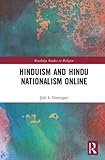Hinduism and Hindu nationalism online / Juli L. Gittinger.
Material type: TextSeries: Routledge studies in religionPublisher: New York : Routledge/Taylor & Francis Group, 2019Description: vi, 181 pages : illustrations ; 24 cmISBN:
TextSeries: Routledge studies in religionPublisher: New York : Routledge/Taylor & Francis Group, 2019Description: vi, 181 pages : illustrations ; 24 cmISBN: - 9781138477988 (hardcover)
- 294.5166 GIT 23
| Item type | Current library | Collection | Call number | Status | Date due | Barcode | |
|---|---|---|---|---|---|---|---|
 Books
Books
|
H.T. Parekh Library | SIAS Collection | 294.5166 GIT (Browse shelf(Opens below)) | Available | K3673 |
GBP 115/-
TBH86/101
Includes bibliographical references and index.
Managing Hinduism in the electronic public sphere -- Analyzing and reading the Web as text -- One-way conversations: webpages and portals -- Two-way conversations: social media -- Hindutva and "hate speech" in the electronic public sphere -- Hindutva vs hashtag feminism -- The saffron effect: transnationalism and diaspora.
Publisher's description: The way people encounter ideas of Hinduism online is often shaped by global discourses of religion, pervasive Orientalism and (post)colonial scholarship. This book addresses a gap in the scholarly debate around defining Hinduism by demonstrating the role of online discourses in generating and projecting images of Hindu religion and culture. This study surveys a wide range of propaganda, websites and social media in which definitions of Hinduism are debated. In particular, it focuses on the role of Hindu nationalism in the presentation and management of Hinduism in the electronic public sphere. Hindu nationalist parties and individuals are highly invested in discussions and presentations of Hinduism online, and actively shape discourses through a variety of strategies. Analysing Hindu nationalist propaganda, cyber activist movements and social media presence, as well as exploring methodological strategies that are useful to the field of religion and media in general, the book concludes by showing how these discourses function in the wider Hindu diaspora. Building on religion and media research by highlighting mechanical and hermeneutic issues of the Internet and how it affects how we encounter Hinduism online, this book will be of significant interest to scholars of religious studies, Hindu studies and digital media.
There are no comments on this title.


